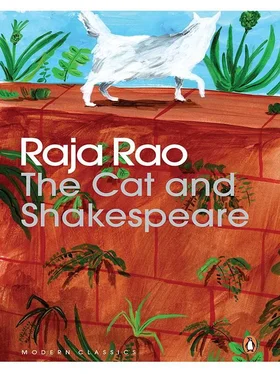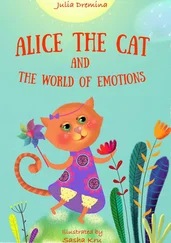Rao Raja - The Cat and Shakespeare
Здесь есть возможность читать онлайн «Rao Raja - The Cat and Shakespeare» весь текст электронной книги совершенно бесплатно (целиком полную версию без сокращений). В некоторых случаях можно слушать аудио, скачать через торрент в формате fb2 и присутствует краткое содержание. Год выпуска: 2014, Издательство: Penguin, Жанр: Современная проза, на английском языке. Описание произведения, (предисловие) а так же отзывы посетителей доступны на портале библиотеки ЛибКат.
- Название:The Cat and Shakespeare
- Автор:
- Издательство:Penguin
- Жанр:
- Год:2014
- ISBN:нет данных
- Рейтинг книги:4 / 5. Голосов: 1
-
Избранное:Добавить в избранное
- Отзывы:
-
Ваша оценка:
- 80
- 1
- 2
- 3
- 4
- 5
The Cat and Shakespeare: краткое содержание, описание и аннотация
Предлагаем к чтению аннотацию, описание, краткое содержание или предисловие (зависит от того, что написал сам автор книги «The Cat and Shakespeare»). Если вы не нашли необходимую информацию о книге — напишите в комментариях, мы постараемся отыскать её.
The Cat and Shakespeare — читать онлайн бесплатно полную книгу (весь текст) целиком
Ниже представлен текст книги, разбитый по страницам. Система сохранения места последней прочитанной страницы, позволяет с удобством читать онлайн бесплатно книгу «The Cat and Shakespeare», без необходимости каждый раз заново искать на чём Вы остановились. Поставьте закладку, и сможете в любой момент перейти на страницу, на которой закончили чтение.
Интервал:
Закладка:
‘How are you, my lord and liege?’
‘Better than if the kingdom were at peace and no wars anywhere.’
‘The Hitlers are in us, like objects in seeing. We think there is Hitler, when Hitler is really an incarnation of what I think. You are bad because I am. You are good because I am. The sun is because I see. You do not suffer because you are the British bubo. Ah, brother, you too be British’—and he guffawed. He liked his own jokes, and tears came to his eyes. Then he smiled in love. ‘I love the British. I respect them because they are such shopkeepers. What can you do after all? If you have to buy you must sell. If you want betel and tobacco, you must work in numbers. You issue ration cards, six hundred seventy a day, and God gives food to the needful. I must say I have never come across so much respect for God as amongst the British. I often think God is a ledger keeper. Loss and gain do not interest him. Accounts do. Even a rat can give trouble to the British.’
‘How so?’ I ask. Govindan Nair’s methods are so devious. I just do not understand.
‘Rats eat up accounts. That is how we explained away the ration given to Kolliathur village. When the big boss asked, ‘Where are the files?’ we made such a grand search. First my boss said: ‘We have misplaced it.’ Then he said: ‘We do not think we have it in this office.’ Finally he wrote: ‘Eaten away by rats. Please ask the Public Works Dept. Officer to come to Ration Office No. 66 for inspection. Two reports on rat pest remain unanswered.’
‘What happened then?’
‘He built a house, that is John did. He built a modest little house. He said it was done from the proceeds of his wife’s property sale. Her grandmother had just died. Everybody has a grandmother, you know.’
‘Where is the house?’
‘On the Karamanai side.’
‘Is it expensive?’
‘Only some fifteen thousand rupees. The Brahmins are getting poorer with the wars. So they sell their houses. Why, soldiers earn more than clerks today. That is the law of the rats.’
‘What do you do then for the rats?’
‘We encourage them. We even invite them, like the Pied Piper, with music.’
‘Seriously speaking?’
‘Dead seriously. Rats are necessary for the ration shops. Otherwise who will eat up all the rice? If you want the population of Trivandrum to feed on food, then you have to employ other means.’
‘What?’ I asked in my denseness.
‘Ah, sir, you need the mother cat,’ he said in utter gravity, then rose and spat out tobacco.
‘Shridhar!’ he shouted. ‘Bring two cups of coffee.’ And settling down, he put some more chalk to his betel, and started chewing again.
‘You need education, sir. You are poor in general knowledge. You do not know you have a grandmother. You know too little about rats. You must become a pathologist and write a paper on the nature of bacteria, as seen in ration-shop ledgers. One rich man in the north, so I heard, was travelling on a train. Where are you going, Seth Sahib? they asked him. I’m going to Jagannath Puri, sirs, for the annual festival of the Lord of Earth. Why, do you belong hereabouts? they said. No, sirs, I come from Calcutta. I am a grain merchant, he said. The famine, we hear is very serious now, they said. Yes sirs, who should know it but me? he said. It must be terrible, they said. Yes, I am going to Jagannath Puri. I am giving the Lord a silver spire, the grain merchant said. Now, I ask of you, my friend, when shall we build your golden spire?’
‘When do you want to?’
‘In four or five months Shantha will have an heir. Let us build a spire ten men high.’
‘It will be three storeys high.’
‘First let us build one two storeys high.’
‘Anything you like,’ I said, laughing.
‘No sir, it is a dead serious matter. A woman bears a child. The child needs a basic house to be born in. You cannot be born just anywhere. Let us buy this house itself,’ he said, spitting out his tobacco. Shridhar had brought in the coffee. He stood there, amazed and in admiration before his father. His father looked like a sea captain hatching plans to decoy a cargo. The night is falling. The sea is calm. The sea will obey the captain. ‘Captain, the sea of Arabia is mild.’ ‘Turn towards the Laccadive Archipelago.’ ‘The Dutch ships sail.’ ‘Who cares if they have guns? We have sinews. You build empires. We build houses. Slaves, to the nor’east!’
One must build a house if one has to have a house, I say to myself. We’ll plant a bilva tree by it. Shantha will look at me, whispering words. How beautiful it is to be pregnant. Why not always be pregnant and four months carrying? You can play with bilva leaves, and, like the hunter, you can go on dropping them on the silence below. Shiva will appear. I envy women that they bear children.
‘Usha will be coming back from school,’ I sit and say, as if to the chair. I have a canvas chair, and, my feet on its edge, I scratch the curve of my limbs, and I think. The coffee has just gone down my throat. I have been to the Home Friends to have my bad cup of coffee. (Sometimes I want to avoid this, and go to the milk bar near my office and gulp a cup of milk. I feel so virtuous after that. But milk is never an immediate friend like coffee. In life we search for truth but live in the illusion of permanence. Milk is good for me. ‘It is good for the mother cat,’ Govindan will shout, and laugh, ‘No cat will ever touch your potion of the dark bean. We have no feline instinct. We live like rats,’ etc., etc.) Thinking of Usha of an evening is a pleasant thing. I could always take her out on a walk: ‘Come, child,’ and she will leave her book and give her little finger for me to take. And so we go. Usha is the dearest thing in my life. She is my child. She is not merely that. She is child. When I hear somebody say, he walks, you may think it is an impersonal, a grammatically correct statement. I walk, he walks, they walk. But for me walking is Usha. When she sits it is sitting. Shantha understands this. Shantha’s silence has all that logic cannot compute. Saroja wants two and two to make four, and if I say, ‘What about your dreams, there do two and two make four?’ she says, ‘It always makes four, according to me. Yet in the logic of my dreams it’s seven. But I am not living in a dream. Usha is five years old. She is not ten. You can open the school register and see.’
When you have Saroja’s logic, what can you do? What logic, Usha must ask herself, has the railway train that says Kimkoo-chig, chug, chug, as if it were a great-aunt, and it goes on spitting out fire at the Elayathur railway station? The train watches all school returners. Evening after evening it will come and spit out friendly smoke. The cigarette vendors, the wada sellers, the coolies, the jhatka- and bandi-walas 6outside will all have a logic with the train system. Soon after the train arrives, passengers will get out. They have so many bundles. Usha is sure the train knows it. She knows too that jhatkas come in the right numbers. As there are so many benches at the school every morning for so many children, you have so many jhatkas. Every evening you have so many bandis. Snakes know when the school children pass. The train has told them: Take care, take care, they are under my protection.
I love Usha for the way she comes back from school. She dreams of the train behind her. She has no fear. For the train will let her pass first on the Sethupallea bridge. Then you go down and stand in the field below, under the small young coconut tree. The train is happy. The tree says, ‘Good morning,’ as the soldiers say to one another. Usha and her friends put stones around the tree. They are building a marriage house. Once the train has passed with all the men and women, faces and shouts, Usha feels she can go home. Saroja does not wait for her. She is busy inspecting the rope making. Saroja is a tremendous worker. For her fact is that which yields. Her fathers have left thirty-three acres of wet land. They worked hard. They gave her and her sister education. Land is a fact. You reap what you sow.
Читать дальшеИнтервал:
Закладка:
Похожие книги на «The Cat and Shakespeare»
Представляем Вашему вниманию похожие книги на «The Cat and Shakespeare» списком для выбора. Мы отобрали схожую по названию и смыслу литературу в надежде предоставить читателям больше вариантов отыскать новые, интересные, ещё непрочитанные произведения.
Обсуждение, отзывы о книге «The Cat and Shakespeare» и просто собственные мнения читателей. Оставьте ваши комментарии, напишите, что Вы думаете о произведении, его смысле или главных героях. Укажите что конкретно понравилось, а что нет, и почему Вы так считаете.












